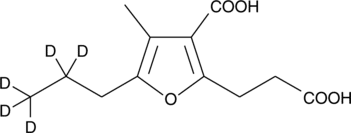Territorial Availability: Available through Bertin Technologies only in France
- Synonyms
- 2-(2-carboxyethyl)-4-methyl-5-(propyl-2,2′,3,3,3-d5)furan-3-carboxylic acid
- Correlated keywords
- standards deuterateds LC/MS GC-MS LC-MS MS mass spectrometry deuterium references thyroxines T3 T4 furan fatty acids inactive primary secreted products thyroid glands converted active hormones triiodothyrodinine enzymes 5′-deiodinase albumin-bound furanoids accumulates serums uremic patients inhibits cellular transport subsequent deiodination displaces competitive binding molecules acidic drugs free oleic endocrinology
- Product Overview:
CMPF-d5 contains five deuterium atoms at the 2, 2′, 3, 3, and 3 positions. It is intended for use as an internal standard for the quantification of CMPF (Item No. 10007133) by GC- or LC-mass spectrometry. Furan fatty acids are unique, naturally occurring lipids that are found in significant amounts in dietary phospholipids, such as in salmon roe.{13184} CMPF is an endogenous metabolite of furan fatty acids in humans. CMPF is highly albumin-bound and accumulates in the serum of uremic patients to concentrations in excess of 0.2 mM. Its primary effect is to inhibit cellular transport and subsequent deiodination of thyroxine (T4).{13104,13105} CMPF is tightly bound to albumin but only moderately inhibits T4 binding in a direct manner (10-14% at 0.3 mM). However, CMPF effectively displaces competitive T4 binding molecules from albumin, such as acidic drugs and free fatty acids.{13105} Therefore, CMPF may indirectly influence T4 binding to albumin by increasing the serum concentration of competitive binding molecules, particularly free fatty acids such as oleic acid.{13105}
Cayman Chemical’s mission is to help make research possible by supplying scientists worldwide with the basic research tools necessary for advancing human and animal health. Our utmost commitment to healthcare researchers is to offer the highest quality products with an affordable pricing policy.
Our scientists are experts in the synthesis, purification, and characterization of biochemicals ranging from small drug-like heterocycles to complex biolipids, fatty acids, and many others. We are also highly skilled in all aspects of assay and antibody development, protein expression, crystallization, and structure determination.
Over the past thirty years, Cayman developed a deep knowledge base in lipid biochemistry, including research involving the arachidonic acid cascade, inositol phosphates, and cannabinoids. This knowledge enabled the production of reagents of exceptional quality for cancer, oxidative injury, epigenetics, neuroscience, inflammation, metabolism, and many additional lines of research.
Our organic and analytical chemists specialize in the rapid development of manufacturing processes and analytical methods to carry out clinical and commercial GMP-API production. Pre-clinical drug discovery efforts are currently underway in the areas of bone restoration and repair, muscular dystrophy, oncology, and inflammation. A separate group of Ph.D.-level scientists are dedicated to offering Hit-to-Lead Discovery and Profiling Services for epigenetic targets. Our knowledgeable chemists can be contracted to perform complete sample analysis for analytes measured by the majority of our assays. We also offer a wide range of analytical services using LC-MS/MS, HPLC, GC, and many other techniques.
Accreditations
ISO/IEC 17025:2005
ISO Guide 34:2009
Cayman is a leader in the field of emerging drugs of abuse, providing high-purity Schedule I-V Controlled Substances to federally-licensed laboratories and qualified academic research institutions for forensic analyses. We are certified by ACLASS Accreditation Services with dual accreditation to ISO/IEC 17025:2005 and ISO Guide 34:2009.





